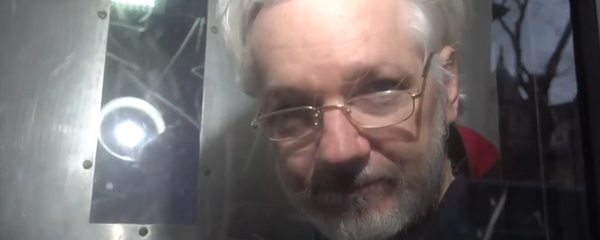Julian Assange was found to be “An intelligent person, characteristic of many high-functioning people on the autism spectrum”, by Dr Quinton Deeley, the Old Bailey heard on Wednesday, 23 September 2020.
Dr Deeley, who is a consultant psychiatrist specialising in autism, ADHD, learning disability, as well as various mental health conditions, testified throughout the morning as to the diagnosis of autism (Asperger) which he had found after an assessment was made.
Mr Assange shows a deep focus on intricacies of systems, which is common for many on the spectrum, although he did show a difficulty in identifying and describing his own emotions and a tendency to not describe emotions in others, according to Mr Deeley. Though "with deliberation", as an intelligent person, he can bring himself to understand other people’s emotions; in "spontaneous day-to-day interactions there is good evidence that he is rather oblivious to those kinds of considerations", the doctor said.
Dr Deeley did concede that whilst it is true that perhaps a majority on the autism spectrum "do not form relationships or at least successfully", there are a minority who do, though often in practice they struggle to understand "more nuanced aspects of relationships".
Ed Fitzgerald QC, for the defence, asked the doctor about Mr Assange's suicide risk, should he be extradited to the US.
"It's an outcome which he fears, which he dreads… he describes as contemplating with a sense of horror - and he ruminates about his perspective circumstances at length. I think that is influenced by his autistic cognitive style to become preoccupied with matters".
The ability to tolerate stress is "reduced in people on the autistic spectrum" and the rates of suicide "are higher among people in the autistic spectrum compared to members of the general public", the doctor explained.
Prosecution challenges the idea that Mr Assange is on the autistic spectrum
James Lewis QC challenged Dr Deeley on his diagnosis of Mr Assange. Two separate clips of the award-winning publisher answering questions at the Frontline Club were presented to the doctor as examples that Mr Assange has the ability to engage in "conversational interchange" notwithstanding his diagnosis.
Mr Lewis asked the doctor whether the fact that Mr Assange had participated in an extensive Q&A session at the Frontlline Club would change his assessment.
Dr Deeley told the court that it's been noted based on interviews with Suelette Dreyfuss, who wrote a book on hacking with Mr Assange, that when Mr Assange is talking about subjects "which he is knowledgeable and has an interest in", he is able to do so at length, which Dr Deeley said is "Not unusual for people who are on the highly intelligent on the autism spectrum". He added that "what happens with intelligent people with autism, very often, it is outside those set pieces", during more "spontaneous interactions", which prove much more challenging.
When Mr Lewis demanded to know whether Dr Deeley was "trying to give an objective opinion to this court", Dr Deeley held firm and said that he was. "Yes. I was trying to offer some important context for the court", the doctor said.
During one of the clips, Mr Assange answered a question put to him about whether news outlets have a responsibility to protect state informants.
"[We are] not obligated to protect other people’s sources, military sources, spy organisations sources, except from unjust retribution, there are numerous cases where people sell information or frame others or engage in genuinely traitorous behaviour. And actually that is something for the public to know about... to know about that behaviour", Mr Assange insisted.
Dr Deeley said that he "wouldn't agree" that the clip was inconsistent with his diagnosis.
"I think that is a very important example of what I was talking about. A highly rehearsed role, talking about a question in which he has expertise, in a highly structured context within an impressive monologue. There isn’t a quality to having to respond to an informal social interaction in which he is required to notice and respond to the emotional cues of his interlocutor. He is in his comfort zone", Dr Deeley responded.
Mr Lewis picked through the report of Dr Deeley and asked him why certain information was left out from his medical notes and the doctor responded that his report, which was based on the totality of factors, had concluded that Mr Assange "falls within the autism spectrum".
Mr Lewis read through medical notes from the prison which remarked on different dates that Mr Assange was seen to have "good eye contact", at times "smiling inappropriately", "interacted well with patients and staff".
Dr Deeley made clear that all of this information "must be placed within the context of the totality in the context of the case". "Eye contact must be in context of all non-verbal communication (body, posture, etc.)", the doctor explained. Furthermore, the patient must be assessed in more formal settings, like when people are being interviewed, as well as more spontaneous items. "Its not concluded that Mr Assange has a complete absence of non-verbal communication", the doctor said, clarifying the contents of the report. "It’s a judgement about the amount and quality of non-verbal communication that he exhibits. I do accept that he was depressed in time and that is an explanation for the reduction in communication".
Mr Lewis' final question was about whether the doctor's assessment that Mr Assange was at "high risk" of suicide should he be extradited was merely in comparison to the general public. The doctor stressed that in his judgement, "Any responsible clinician caring for Mr Assange under present circumstances would ensure that risk of suicide was actively managed, should a determination be made to extradite him".
The WikiLeaks publisher faces up to 175 years in prison in the US on 17 Espionage Act charges and one charge relating to conspiring with Ms Manning. Nearly the entire indictment relates to the publication of classified documents in 2010 and 2011, which revealed, among other things, war crimes and other criminality committed by US-led forces in Iraq Afghanistan and Guantanamo Bay, Cuba, as well as US diplomatic cables.





